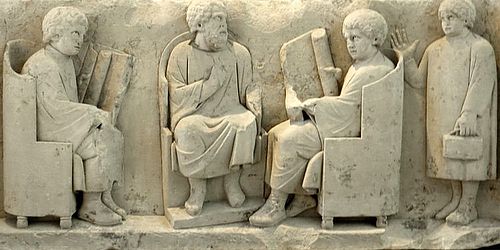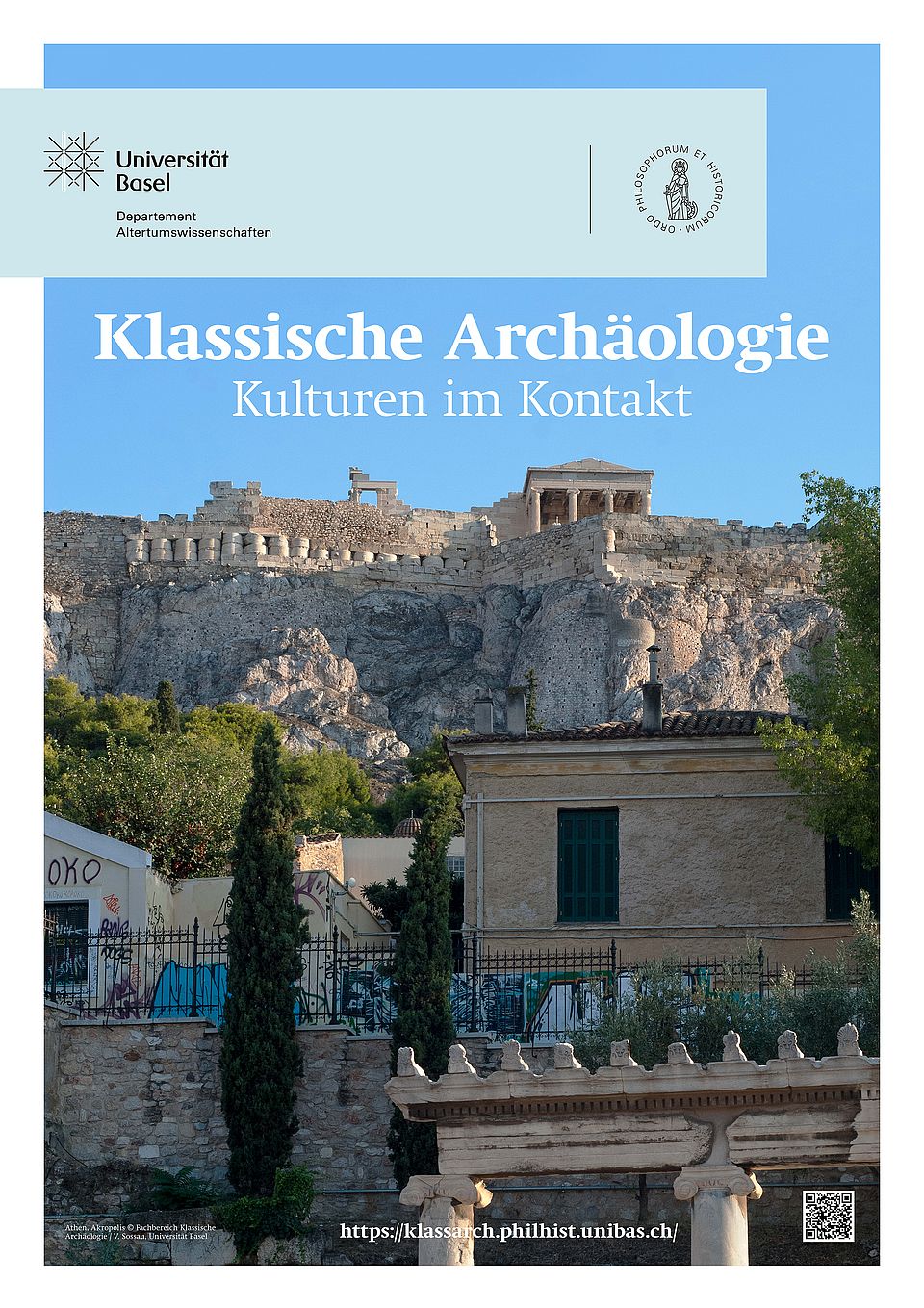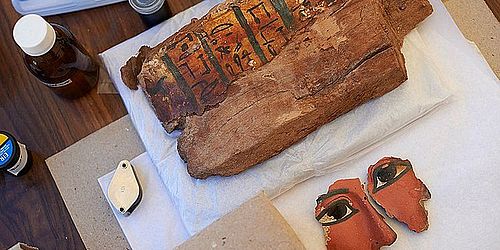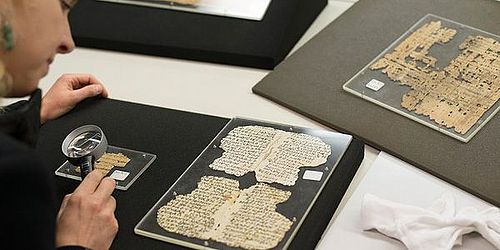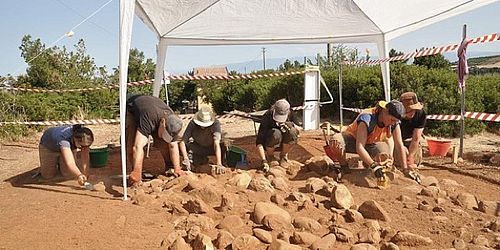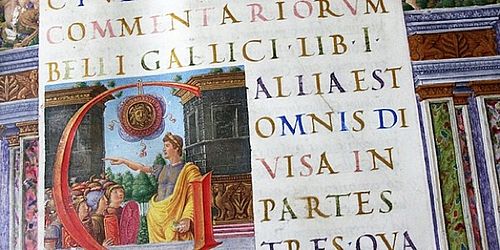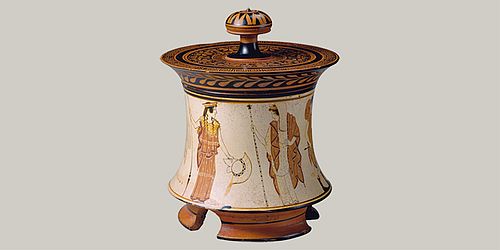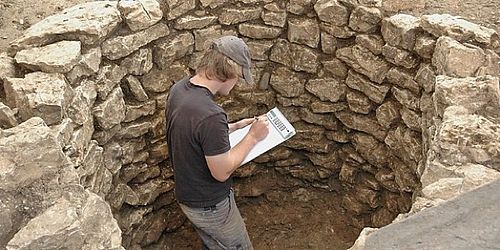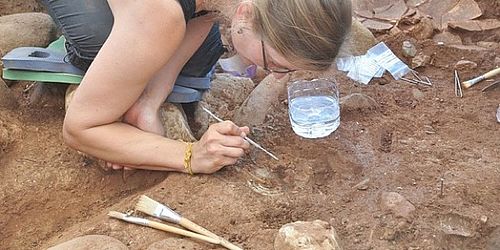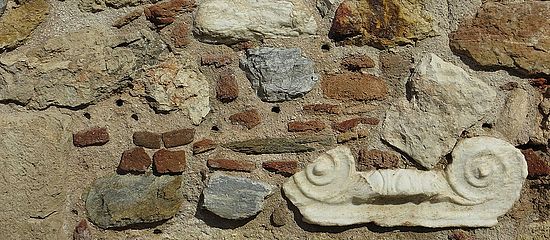
Degree Subjects and Programs
Studying Ancient Civilizations on the Bachelor Level
The program in Ancient Civilizations introduces students to a wide range of basic knowledge in the studies of the ancient world in the introductory level (Grundstudium) and provides insight into the fundamental working techniques, methods and theories of all subject areas. At the advanced level (Aufbaustudium), this basic knowledge is expanded. In the Bachelor degree subject, students acquire in-depth knowledge as well as specific methodological and theoretical skills in one subject area, in the Bachelor degree program, in two subject areas. In this process, the shared perspective of cultural studies and the examination of methodological questions form the unifying basis of Ancient Civilizations.
Common learning objectives are: acquiring subject-specific methods and research techniques; developing overview knowledge; gaining insight into exemplary research areas and into the development of scientific questions; professional ethics; a critical reappraisal of the effects and influences of antiquity.
After completing a Bachelor's degree on this wide, interdisciplinary foundation, students can specialize in one or two Master's degree subjects in Ancient Civilizations.
Study focuses in the BA degree program and subject
The research subject of Egyptology comprises the culture and history of Ancient Egypt from the early period (4th millennium BC) to the Coptic Late Antiquity (7th century AD). The basis for this is provided by written and material evidence. Textual legacies exist in various levels of language and writing, e.g., as inscribed monuments or papyri, and may be literary, religious, or administrative in content. Material legacies include temples, tombs, settlements, as well as groups of objects such as sculptures, stelae, vessels, furniture, etc. Egyptology investigates ancient Egyptian culture through historical, archaeological, social and religious-historical, cultural-historical, art-scientific as well as literary and linguistic questions. The various research foci together aim at a broad-based approach to ancient Egyptian culture.
Basel Egyptology distinguishes itself in the fields of cultural studies and archaeology as well as linguistics and textual studies. Teaching covers the following basic areas: language and scripts (Classical Egyptian, Ancient Egyptian, Hieratic, Modern Egyptian, Demotic or Coptic), history, religion, as well as architectural and object studies of all periods. The course of study is based mainly on literature research, but also includes regular excursions to museums and, where appropriate, participation in excavations or internships. The research topics are situated in the fields of archaeology (Valley of the Kings, Theban necropolis, Deir el-Medina), religion (burial and tomb furnishings, personal piety, rituals, funerary texts), history (social history, cultural contact), writing and iconography as well as linguistics and textual studies (literature, philology and linguistics).
At the Bachelor's level, the University of Basel offers a major or a course of study in "Studies of the Ancient World", in each of which Egyptology can be chosen as a focus.
In the major, Egyptology is studied in combination with another faculty or non-faculty subject.
In the degree program, Egyptology represents one of two concentrations in Studies of the Ancient World, which means that the study program focuses entirely on content from the field of Studies of the ancient world.
The study of Ancient History aims at an extended knowledge of Greek and Roman antiquity and likewise at an understanding of the different cultures of the Mediterranean region, with a special focus on questions of political, social, economic and everyday history. Students learn to work with the subject-specific methods of historical studies, but also to use the methods of the other disciplines of studies of the ancient world to answer historical questions. In this way, the program enables students to work independently and scientifically, to find answers to historical questions, and to communicate these answers in a way that is appropriate for the target audience. The study program includes excursions to the countries of the Mediterranean region and, if necessary, participation in research projects, the conception of exhibitions and the organization of international conferences.
At the subject area of Ancient History in Basel, decided focal points have emerged that shape and enrich the course offerings in addition to the classical subject areas of Greek and Roman antiquity. A special profile feature of the subject area of Ancient History in Basel is the focus on the social, economic and religious history of Greco-Roman Egypt, which is made accessible by the countless papyrological testimonies and on which several research projects with far-reaching international cooperation are maintained at the department. Moreover, the interest in the cultural history of antiquity, which has a long tradition in Basel, also flows into the teaching of Ancient History.
In Basel, Ancient History is taught in its entire breadth. The focal points in research and teaching include:
- History of Greece and Rome
- History of the family; house and household in antiquity
- Social, economic and religious history of Greco-Roman Egypt; papyrology
- Ancient history of everyday life; ancient demography
- Early Christianity; late antiquity and early Byzantine period
- Emergence and distinctiveness of the polis, Athenian democracy, and Sparta
- Hellenism (with special consideration of the Near East)
- Constitution of the Roman Republic
- History of science and historiography
Those who want to study ancient history in Basel have several options.
Ancient History is an ancient science by virtue of its object of research - Greco-Roman antiquity - but methodologically it is also a historical science. Therefore, the study of Ancient History is possible both within Studies of the Ancient World with a methodological focus in the historical field and within Historical Studies with an epochal focus in the ancient world.
At the Bachelor's level, the Faculty of Philosophy and History offers an integrated bachelor's degree program in Studies of the Ancient World in which students can choose to major in Ancient History.
Likewise, however, you can also specialize in the epoch of Greco-Roman antiquity in the bachelor's program in historical studies.
Classical archaeology focuses on the material legacy of the regions of the Mediterranean and neighboring areas shaped by Greek and Roman culture from prehistory to late antiquity. It excavates, identifies, scientifically indexes and secures their availability for future generations through restoration, archiving or museum presentation.
In addition to the formal and contextual analysis of the monuments, great importance is attached to the understanding of the ancient imagery from the viewpoint of art and cultural history. In this context, the material legacy of the Greco-Roman world is not understood as a self-contained system, but rather as part of a network that was closely interwoven with neighboring cultures in a variety of ways throughout the ages.
At the Bachelor's level, the University of Basel offers a major or a course of study in "Studies of the Ancient World", in each of which Classical Archaeology can be chosen as a concentration.
In the major, Classical Archaeology is studied in combination with another faculty or non-faculty subject.
In the program, Classical Archaeology represents one of two concentrations in Studies of the Ancient World, which means that the program focuses entirely on content from the field of Studies of the Ancient World.
In conjunction with the other disciplines of Studies of the Ancient World at the University of Basel, Latin Philology offers students a broad and well-founded knowledge of Roman antiquity. Students first acquire the basic knowledge in the BA basic studies; in the postgraduate studies with a focus on Latin Philology, they are then familiarized with the fundamentals of the subject in terms of content as well as methodology.
The subject is taught in lectures, which provide an overview of Latin literature, its content and scientific issues, as well as in proseminars and seminars, in which central topics are studied in depth and the tools and methods of scientific work are taught. This offer is supplemented by exercises which pursue different objectives: the introduction to Latin philology offers first insights into the broad field of activity and the numerous possibilities of activity of the subject; in the language and style exercises the acquisition and consolidation of the knowledge of the Latin language are in the foreground; the reading exercises allow students to practise and consolidate the skills they have acquired in the language exercises. Supplementary exercises, such as metrics, epigraphy, translation theory and more, provide in-depth philological knowledge and explore specific topics outside the usual teaching canon. In addition, regular excursions to libraries, museums and archaeological sites enrich the curriculum. Guest lectures by international researchers offer students the opportunity to gain an insight into current research issues and learn about other research traditions.
The goal is mastery of the language, fluency in interpretation, knowledge of Roman ancient culture along with its modern reception.
In addition to an academic career and teaching at schools and grammar schools, a degree in Latin Studies opens up a wide range of career prospects. The knowledge of the Latin language and ancient culture and its afterlife acquired during the course qualifies graduates of Latin Studies for careers in academic institutions such as museums, libraries and archives. At the same time, a degree in Latin Studies provides an excellent basis for careers in a variety of fields that require experienced and sophisticated text production (journalism, publishing, cultural mediation, tourism, advertising, etc.).
Latin Philology can be studied at the BA level as a major, either as part of the Bachelor's degree program (BDP) in Studies of the Ancient World in combination with another Bachelor's degree program subject within the Faculty of Philosophy and History or an extra-faculty subject, or as part of the Bachelor's degree program (BDP) in Studies of the Ancient World in combination with a second major within Studies of the Ancient World (Egyptology, Ancient History, Greek Philology, Classical Archaeology, Prehistoric and Early Historic and Provincial Roman Archaeology, Natural History Archaeology).
The close connection of Greek Philology with the other disciplines of Studies of the Ancient World at the University of Basel enables students to acquire a broad basic knowledge in the BA basic studies. In the postgraduate studies with a focus on Greek Philology, students are taught a comprehensive foundation of the subject in terms of content as well as methodology. The subject is taught in lectures, where the main areas of literary history are covered, in (pro-) seminars, where scientific work on the texts is practiced, as well as in special exercises, for example on metrics, epigraphy and papyrology, and in colloquia, reading and language exercises. From time to time excursions to Lower Italy or Greece take place.
The goal is mastery of the language, fluency in interpretation, knowledge of ancient Greek culture along with its modern reception, and, last but not least, the ability to reorient oneself in contemporary discourses such as literature, theater, philosophy, politics, and the visual arts through familiarity with Greek as the "nearest foreigner."
Accordingly, in addition to traditional teaching careers in high schools and universities and in employment in scholarly projects, the study of Greek Philology qualifies students for the same professions as other humanities studies, e.g., journalism and publishing, or for other cultural and text-oriented jobs (libraries, archives, cultural management, theater, museums, private industry, and consulting).
The subject of Greek Philology can be studied at the BA level as a major, either as part of the Bachelor's degree program (BDP) in Studies of the Ancient World in combination with another Bachelor's degree program subject within the Faculty of Philosophy and History or an extra-faculty subject, or as part of the Bachelor's degree program (BDP) in Studies of the Ancient World in combination with a second major within Studies of the Ancient World (Egyptology, Ancient History, Classical Archaeology, Latin Philology, Prehistoric and Early Historic and Provincial Roman Archaeology, Natural History Archaeology).
The main task of the Vindonissa professorship in teaching is to convey the most important aspects of provincial Roman archaeology. This is done primarily with the help of the archaeo(bio)logical primary sources, i.e. the features ("from the sewer to the rubble of destruction") and the finds ("from the amphibian bone to the brick"). Historical, epigraphic and numismatic sources are equally important.
In a five-semester cycle of lectures, the important historical events as well as the cultural, social and economic history in the northwest of the Imperium Romanum are discussed, each starting from the situation in the area of today's Switzerland.
In the exercises and (pro-)seminars we deal with selected aspects of the "Roman way of life" - whenever possible on the basis of original finds and with a concrete goal (e.g. exhibitions, publication, etc.).
In order to provide training that is as practical as possible, we regularly carry out teaching and research excavations, for example in the lower town of Augusta Raurica (2011-2013) or in the area of the late Roman fortifications in Koblenz and Möhlin (2014).
Practical training also includes conducting or assisting in geophysical and terrestrial prospections, such as in the forefield of the west gate of the legionary camp of Vindonissa (2011) or in the canton of Obwalden (2012 - 2014).
Visits to ongoing excavations as well as smaller and larger excursions provide opportunities to get to know important regions, sites and museums in Switzerland and abroad.
At the Bachelor's level, the University of Basel offers a subject "Studies of the Ancient World" or a course of study "Studies of the Ancient World" in which Provincial Roman Archaeology can be studied with a focus on Prehistory and Early History and Provincial Roman Archaeology.
At the Master's level, the University of Basel offers a subject "Prehistory and Early History and Provincial Roman Archaeology" or a program "Archaeology and Natural Sciences" in which Provincial Roman Archaeology can be studied.
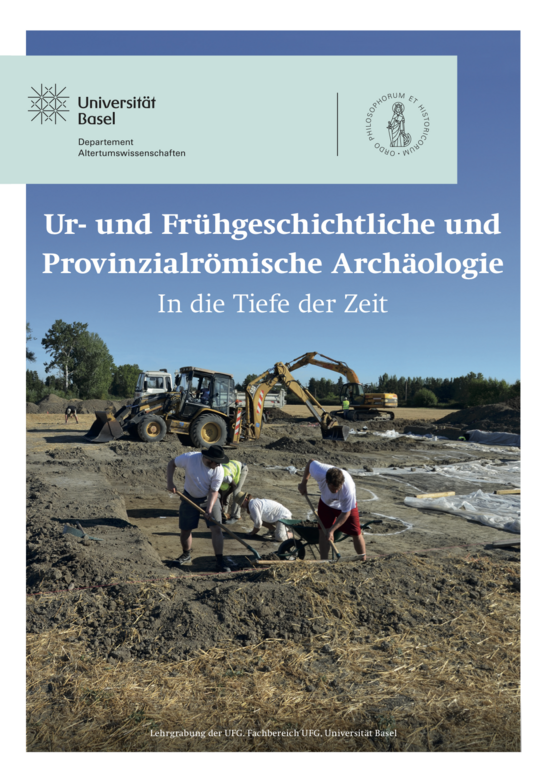
Historical-Comparative Linguistics complements the course offerings of Basel Studies of the Ancient World.
The small teaching load consists of a lecture in which central linguistic topics such as etymology and phonology are treated in a diachronic perspective, a seminar that focuses on an Indo-European language, such as Sanskrit, Gothic, or the Italic languages other than Latin, and an exercise that is preferably, but not exclusively, devoted to Greek and Latin linguistics and touches on topics such as the languages of Plautus and Homer, Mycenaean Greek, or the Pompeian wall inscriptions.
Historical-Comparative Linguistics cannot be studied as a stand-alone major at the BA level, but it can be a major within the Latin Philology and/or the Greek Philology program.
These two subjects are studied either within the Bachelor's degree program (BDP) in Studies of the Ancient World in combination with another Bachelor's degree program subject of the Faculty of Arts and Humanities or an extra-faculty subject, or within theBachelor 's degree program (BDP) in Studies of the Ancient World in combination with a second concentration within Studies of the Ancient World (Egyptology, Ancient History, Greek Philology, Classical Archaeology, Latin Philology, Prehistoric and Early Historic and Provincial Roman Archaeology, Natural History Archaeology).
In each case, there is the possibility to write the qualification theses in Historical-Comparative Linguistics.
Prehistoric and Early Historic and Provincial Roman Archaeology (PEH & PRA) deals with the history of mankind from the Stone Age to the Early Middle Ages. Prehistoric and Early Historic Archaeology (PEH) studies societies of the past that have left little or no written evidence. Provincial Roman Archaeology (PRA) is dedicated to the living conditions in the provinces of the Roman Empire.
PEH and PRA gain their knowledge primarily from archaeological sources, i.e. from material remains of settlements, tombs, sanctuaries etc.. The PRA also draws on supplementary pictorial and written sources. Taking into account research results from neighboring disciplines, partly also in interdisciplinary cooperation with them, PEH and PRA reconstruct the way of life of the people of that time and offer insight into the cultural diversity of human societies.
The subject Prehistoric and Early Historic and Provincial Roman Archaeology can be studied at the BA level as a major, either as part of the Bachelor's degree program (BDP) in Studies of the Ancient World in combination with another Bachelor's degree program subject within the Faculty of Humanities and Social Sciences or an extra-faculty subject, or as part of theBachelor's degree program (BDP) in Studies of the Ancient World in combination with a second major within Studies of the Ancient World (Egyptology, Ancient History, Greek Philology, Classical Archaeology, Latin Philology, Natural History Archaeology).
Integrative Prehistory and Archaeological Science (IPAS) is a unique combination for Switzerland of research areas in the humanities and natural sciences and teaching programs in archaeology under one roof.
'Integrative' emphasizes the goal of jointly and interdisciplinarily researching and better understanding man's past from the Stone Age to the present.
The integrative approach allows, for example, detailed insights into the daily life, diet, economy, culture and environment of the inhabitants of Neolithic pile dwellings, Roman manor houses or medieval towns.
Prehistoric archaeology (prehistory) is a historical science that deals with people, their environment and their cultures in periods without or with little writing.
Natural history archaeology covers all epochs from the Paleolithic to the Early Middle Ages. Scientific methods are used to analyze the remains of human culture (e.g., stone, bone, and antler artifacts, plant remains) revealed by excavations and place them in the context of cultural, environmental, nutritional, and economic history.
Within the Bachelor's degree program and major in Studies of the Ancient World, an undergraduate major and concentration in archaeological science is offered.
Studying Ancient Civilizations on the Master Level
To be admitted to a Master's program, a first academic degree (Bachelor of Arts or equivalent) is required.
At the Master level, the subject areas of Ancient Civilizations offer either individual Master's degree subjects, which can be freely combined with each other or with another intra- or extra-faculty subject, or the Master's degree program Archaeology and Natural Sciences.
Master Degree Subjects and Programs
Quick Links

